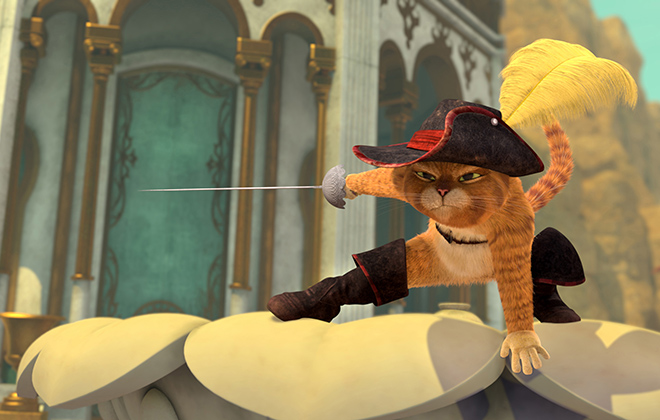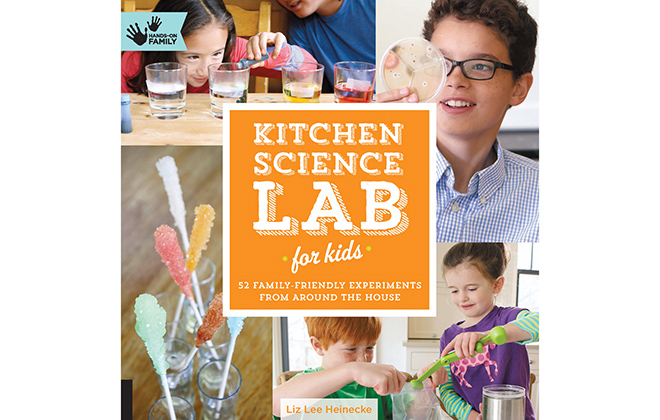A mishmash of family fun and news

Puss in Boots faces off against The Duchess -- who is out to rule the world by harnessing the power of sorcerers -- in "Duchess," one of the first five episodes of DreamWorks Animation's "The Adventures of Puss in Boots," an all-new Netflix original series that premieres Jan. 16. (TNS)



Netflix taps voice actor’s imitation prowess for its new ‘Puss in Boots’
"The Adventures of Puss in Boots’" debuted Friday on Netflix
Stop by Eric Bauza’s house and you might find him in the closet.
He’s not obsessed with fashion, he’s doing his job. The Canadian voice actor uses the walk-in closet in his home as a makeshift recording studio. It’s the quietest place for him to make recordings when working on a new project. The silence is particularly important when he’s trying to match voice work done by another actor.
That’s what he’s doing with the new Netflix animated series from DreamWorks Animation, "The Adventures of Puss in Boots." In addition to the five episodes that premiered Friday, new episodes will debut throughout the year on Netflix.
Antonio Banderas has been the voice of the swashbuckling tabby since the character was introduced a decade ago in "Shrek 2."
Don't miss out on what's happening!
Stay in touch with breaking news, as it happens, conveniently in your email inbox. It's FREE!
"As a voice imitator, it’s important to study and absorb certain personalities and characteristics. You never know if you are going to be able to do it until you are asked," Bauza says, switching to an imitation of actor Paul Giamatti. "I didn’t know I could do Paul Giamatti until I had to."
He jokes that his neighbors must think there are 12 people living in his apartment because of all the voices he does.
For "The Adventures of Puss in Boots," Bauza not only had to match the soft Latin voice Banderas gave the cat, he had to find the right attitude to play the character. Puss in Boots is a romantic, scalawag, confidant and thief. All of those traits must come through as Puss in Boots visits a magical town where everyone lives in happiness and harmony.
That changes when he paws around the legendary treasure that has kept the town hidden from the world.
"This is a comedy show, but it’s filled with lots of adventure and wild characters," says executive producer Doug Langdale. "Puss in Boots is a hero — so, naturally, our show really focuses on how he saves the people of this magical town and defeats the bad guys, and there’s lots of swordplay and combat action."
To match the work Banderas had done, Bauza not only listened to all the films featuring the cat, he watched footage of Banderas recording the voice. That’s where Bauza discovered the key to speaking for Puss in Boots.
"What I saw when I watched Antonio was that he was having a good time," Bauza says. "Puss in Boots has an attitude. He’s a bit of a womanizer. He’s a hero and an outlaw. It’s also a challenge because Puss speaks in such a whisper.
"But, when I’m doing the voice, I’m not imagining myself as a cat. I’m thinking of what Antonio would have done that day," he says.
The team behind the new series knew Bauza could bring just the right voice to the character. He’s the voice of Chet in the DreamWorks animated series "Turbo FAST." His other voice credits include work on "Teenage Mutant Ninja Turtles," "Adventure Time," "Ben 10: Omniverse" and "The Book of Life."
It’s a long list of credits for a person who started working in animation as a character designer, working with a few production studios in Hollywood. He switched from drawing to talking when friends asked him to record "scratch" tracks, temporary recordings that are generally replaced later.
Also providing voices in "Puss in Boots" are Jayma Mays, Laraine Newman and Joshua Rush. Recurring and guest-starring voices will include John Leguizamo, Danny Trejo, Maria Bamford and Jim Cummings.
Rick Bentley, Fresno Bee
Cooking experiments make science fun for kids
Consider yourself forewarned. Do not try this experiment in your kitchen. Actually, never inside your home. This is strictly an outdoors kind of thing.
Liz Lee Heinecke would offer this advice to would-be scientists of any age. But in the event that the younger set doesn’t pay attention — and they likely won’t — parents should.
It’s the soda geyser experiment that has thrilled kids for years. Empty a paper tube filled with Mentos mints into a liter bottle of Diet Coke and see what happens. (The name alone depicts the carbonated chemical reaction: soda geyser.)
This is one of 52 experiments from Heinecke’s first book, "Kitchen Science Lab for Kids" (Quarry Books, 144 pages, $24.99), recently published with 52 family-friendly experiments that make use of supplies readily found around the house. Heinecke takes kids — and their parents — through the step-by-step process of scientific method, with easy-to-follow instructions and photos.
The Minneapolis scientist and mother of three (ages 8, 12 and 14) shifted her attention to the kitchen lab once her children were born. She writes about their experiments — and offers videos, as well — at her website, www.KitchenPantryScientist.com. You can also find the experiments on her iPhone app called Kidscience.
Experiments in the book include tie-dye milk, a paper bag volcano, marshmallow catapults, pizza box solar oven, red cabbage litmus paper, cornstarch goo and yeast balloons.
Another experiment we’re anxious to try: standing on a carton of raw eggs, which shows the strength of eggshells. (The arched shape of eggshells makes them much stronger than they look, though the book notes, "The eggs probably won’t break.")
To do this, make sure no eggs in the carton (or two — since you have two feet) are cracked, and turn the eggs so they all point in the same direction (either side up). Set the cartons on a flat surface, such as a driveway and, without shoes or socks, carefully step onto the eggs with your entire foot, making sure you keep your feet flat. What better way to use a dozen or more eggs?
Question: Your message seems to be that there’s an element of science in everything.
Answer: Cooking is chemistry. I’ve gone to lots of science education conferences, and one thing chemists talk about in particular is what we call chemo-phobia: People say they don’t want chemicals in their food. But in fact your whole kitchen is full of chemicals. This is a way to educate yourself on which chemicals we safely use in everyday life.
Q: What mash-up of science and cooking do you teach kids?
A: Two of the main ingredients I use in lots of the experiments are baking soda and vinegar. When I go around talking science with kids, I teach them the scientific names: Baking soda is sodium bicarbonate. I will ask if any of them have baked cookies, and many of them have. And I ask if they know what baking soda does, and many of them do. It’s a chemical ingredient that helps make cookies rise.
Then I ask who has vinegar in their kitchen. Most kids know, even the little ones. Does it taste sweet or sour? What do you use it in? Pickles. I will tell them it tastes sour because it’s a mild acid. I will teach them that the scientific name is acetic acid. Adding a little acid to food makes it taste better and more flavorful. This is why we add lemon juice and vinegar to lots of foods.
Q: What do kids learn from these experiments in the kitchen?
A: Cooking and science are very engaging for kids because kids learn in a variety of ways. Lots of kids are visual learners. Lots of kids are tactile learners. Lots of kids like to smell things. As you’re doing science and cooking or baking (which is basically chemistry), you have all these things: color, maybe sound, you’ll have your hands in there if you’re making bread dough or if you’re doing an experiment. That’s why cooking and science are really good ways to engage kids in creative activities because they appeal to all kinds of learners.
It’s also just a life-skill thing. Learning to cook and understanding why you add baking soda is a life skill. It makes life more enjoyable if you can cook good food and eat it — and if you know this will taste way better if you add a little bit of vinegar.
Lee Svitak Dean, Minneapolis Star Tribune




